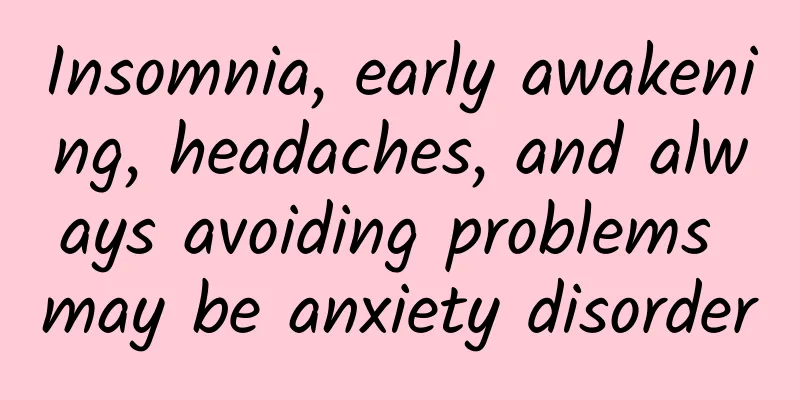Are you "early menopause"? The sooner you read it, the sooner you will benefit

|
Many middle-aged women have menstrual disorders, accompanied by symptoms such as inner irritability, and wonder if they are experiencing "early menopause"? There are even more doubts about menopause. In this issue, follow Jiang Jiang and Su Su to learn more about it. What is menopause? Menopause, also known as perimenopause, is a transition period when the ovaries go from being energetic to gradually aging and finally declaring "retirement". The most important sign is: ≥2 changes in the length of the menstrual cycle; the difference from the normal cycle is greater than 7 days, but less than 2 months. For example, menstruation originally occurred once a month, but now it becomes once every 20 or 40 days. In addition, if there are other symptoms such as hot flashes, sweating, insomnia, panic, mood swings, vaginal dryness, etc., it is likely that it is a manifestation of menopause. In life, some of us experience menopausal symptoms in our early 40s, while others still have menstruation after 55... At what age is it reasonable to experience menopause? What is “early menopause”? "Early menopause" means the menopause comes early. Symptoms of menopause usually appear around the age of 50, but due to life and work pressure, more and more women are experiencing early menopause (i.e. "early menopause"). Clinically, after the age of 40, if menstruation stops for more than one year, excluding pregnancy, it can be diagnosed as menopause. Before the age of 40, if ovarian failure leads to amenorrhea, it is "premature aging." If you suspect that you have premature menopause, you should go to the hospital as soon as possible and undergo sex hormone tests and gynecological ultrasound under the guidance of a doctor to further understand ovarian function. What factors can lead to premature menopause? Every woman will have menopause. According to domestic statistics, the average age of menopause for women is 50 years old, and it may be earlier or later for different people. No one wants to have "early menopause", but unfortunately, it is destined to come early or late. Yes, the timing of menopause is largely determined by genes. When a woman has her first menstruation (the ovaries start to work) and when she reaches menopause (the follicles in the ovaries are used up and exhausted) is determined by the "alarm clock" in our brain, and this "alarm clock" is mainly determined by genes. However, the expression of these genes will be more or less affected by environmental factors and acquired experiences, which is why menopause occurs earlier or later. What factors lead to "early menopause"? The key reason for "early menopause" is premature ovarian failure. In addition to being affected by genes, premature ovarian failure is also affected by many external factors, such as environment, life pressure, emotional state, menarche, etc., as well as the following points: 1. Medical Medical treatment may cause some irreversible damage to the ovaries, such as surgery, hormone-like drugs, radiotherapy and chemotherapy. 2. Weight loss The rapid reduction of body fat in a short period of time can lead to hormonal disorders, which in turn lead to amenorrhea. This abnormal amenorrhea inhibits the ovarian ovulation function and further promotes premature ovarian failure. 3. Disease Some viral infections are related to premature ovarian failure, such as herpes simplex virus, mumps virus (childhood), etc., and some immune diseases may be accompanied by premature ovarian failure. How to “delay” or prevent it? To prevent premature menopause, endocrinologists offer the following recommendations: 1. Balanced diet. Do not be picky or partial in eating, and eat a balanced variety of foods such as vegetables, fruits, and grains. This is crucial to maintaining hormone balance. 2. Maintain a reasonable amount of exercise. The general population (especially after the age of 40) should exercise for more than 40 minutes every day, which is very important for improving the body's metabolic rate and controlling weight. 3. Maintaining an optimistic attitude will have a positive impact on the body's endocrine system. 4. Create a healthy environment. Smoking will accelerate ovarian aging, so quit smoking and avoid secondhand smoke. 5. Actively avoid some pollution sources, such as radiation, air pollution, decoration pollution, etc., reduce exposure to environmental toxins, get more in touch with nature, and maintain a healthy lifestyle. Finally, I just want to say, stop using menopause to mock women! Menopause itself is not a disease, but a stage in life. During this stage, the physiological changes caused by hormones can make life awkward and embarrassing, and even worse and worse. Studies have shown that the incidence of depression symptoms in menopausal women is 35.47%. I hope that with more understanding and care, women in this stage can go through menopause more smoothly. |
<<: How to screen for osteoporosis risk when women have higher bone density than men?
Recommend
Unveiling the mystery of neuroendocrine tumors, somatostatin receptor-PET imaging brings new hope
Author: Hao Tingting Reviewer: Zhao Yinlong In re...
Can I massage my breasts if I have breast hyperplasia?
Fibrocystic breast disease is a common breast dis...
Women who love beauty may become infertile if they use this substance for a long time!
As people’s lifestyles change, more and more peop...
What to do if you have a poor appetite during pregnancy?
What should you do if you have a poor appetite du...
A woman who used this paper developed gynecological disease
There are many vaginal hygiene products for women...
What if I have a heavy menstrual period for the first time after giving birth?
Menstruation is an important phenomenon for women...
What is the reason for the middle of the breast
Pain between the two breasts is usually a serious...
It is normal for menstruation to be delayed for a few days
Basically every woman has faced the problem of de...
What is the best food for women with damp-heat constitution?
Traditional Chinese medicine classifies each pers...
Things to note during the thirteenth week of pregnancy
It is the thirteenth week of pregnancy, and the p...
The color of a woman's organ can tell how long she will live
When the weather is dry, your lips will become cr...
Woman's body structure
Women are also an important part of human reprodu...
What to do if a susceptible population has mixed infection? Part 2 of a series of interpretations on prevention and treatment of respiratory diseases in winter
On November 26, Mi Feng, spokesperson of the Nati...
Breast swelling and inflammation pictures
Mastitis develops rapidly and may be accompanied ...
Why should we drink less carbonated drinks with bubbles?
Do you like carbonated drinks? If you are a carbo...









